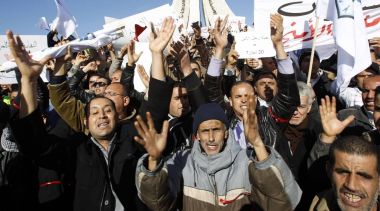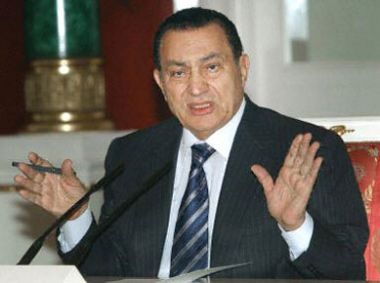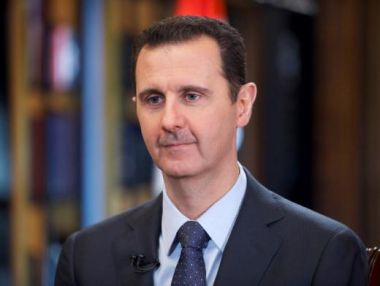The rise of ISIS, Christian persecution and an uncertain future: the Arab Spring, five years on...

It was a moment gravid with significance. One of the defining moments of the 21st century so far. As significant as that dreadful moment the first plane hit the World Trade Centre. As far-reaching as any election result, natural disaster or economic collapse. It happened in an unexpected place.
The Arab Spring looked for a time like it may be a chance for democratic reform and the extension of freedom, but five years later the situation looks bleak. The rise of ISIS has been swift and devastating. Historic Christian communities have been decimated. Middle Eastern Church leaders have warned that Christianity is at risk of extinction. Any initial hope has been severely damaged, if not extinguished entirely.
How did the Arab Spring degenerate so quickly? And what lessons can we learn as the whole region faces an uncertain future?
It wasn't widely reported on the day, but five years ago today, the Arab Spring began. In Tunisia, with resentment against the autocratic regime bubbling under, a small town market trader had his stall confiscated by an official. It was the final straw for Mohamed Bouazizi, who set himself on fire in protest. Soon, the discontent in much of the country began to boil over.
Protests erupted. As Bouazizi lay dying, the demonstrations spread and a tide of change swept the nation. Before long, the extended reign of president Zine el-Abidine Ben Ali was over. Tunisia had been changed. This was important in itself. But the domino effect of the uprising was felt across the rest of North Africa and the Middle East, and by extension, the whole world.

Soon, demonstrations began in the iconic Tahrir Square in Cairo. Egypt's dictator Hosni Mubarak had seemed unassailable. He'd been in control for 27 years and had been feted by Tony Blair as, "immensely courageous and a force for good." But soon, the Arab world's most populous country was also in turmoil.
Mubarak was losing his grip. While his forces cracked down on demonstrations, hundreds were killed and thousands injured, but that couldn't halt the spread of the revolution and soon he was gone.
This was a major milestone. Other countries in the Middle East began to experience protests of their own. Tunisia and Egypt had shown the blueprint. Now it was the turn of Libya.
Another long-reigning tyrant (and confidant of Blair) Colonel Muammar Gaddafi had ruled (and repressed) Libya since 1969. But the momentous events of the Arab Spring were soon to sweep him away too. Unlike the Tunisian and Egyptian uprisings, the Libyan resistance to Gaddafi was assisted by the US and the UK and other NATO forces.
In a relatively brief civil war, Gaddafi was routed. He was killed by opposition forces along with the remnant of his supporters and bodyguards, with whom he'd been on the run.
It was clear at this point that any romantic notions of the Arab Spring as being a purely bloodless, democratic movement were wide of the mark. Gaddafi, horrific dictator and sponsor of terrorism though he was, had been summarily executed. While the Tunisian President had escaped and the Egyptian President imprisoned, Gaddafi's fate showed the world that the Arab Spring had the potential for violence in the same way as many revolutions before it.
This was to be confirmed over the coming months and years. Protests in Yemen began to dissolve into armed conflict and uprising. Soon, the country was in the grip of a bitter conflict. This has continued intermittently ever since. In 2015 this has been more intense than ever, with Iranian backed rebels and a Saudi supported coalition causing devastation to the country.
In nearby Bahrain, the Sunni Kingdom has a majority Shia population. This led to tension and demonstrations in the wake of the Arab Spring. With Saudi military assistance, these demonstrations were put down violently. Incredibly, international sporting events such as the Formula One Grand Prix carried on regardless – despite widespread accusations of human rights abuses by the government. Protests continue to bubble up in Bahrain.
The Arab Spring had more minor effects in several other countries in Africa and the Middle East, but the one area in which it has had arguably the biggest impact is Syria (and Iraq).

Bashar al-Assad was in some ways different to the autocrats who'd already been toppled by the Arab Spring. He was younger, had only been in power for 11 years and from the Alawite sect. But in other ways he was similar. He held tightly to power, which had been handed to him by his family. His Ba'athist politics were of a similar kind to other dictators in the region. They were less religious ideologues, more obsessive nationalists – determined to cling to power whatever the cost – (think of Saddam Hussein's willingness to fight to the death in Iraq against vastly improbable odds).
When an uprising began in Syria it seemed that one of the region's traditional powerhouses may be tottering. But very quickly it became clear that this wasn't a peaceful affair; a rapid crackdown from Assad's forces meant the conflict escalated. As the Syrian Civil War developed, the true scale of the horror began to unfold. A porous border with Iraq enabled Sunni extremists to flood into the Syrian conflict. Shia forces such as Lebanon's Hezbollah began to get involved. To varying degrees, the Syrian Army relied on the support of Russia and Iran, while the rebel forces splintered.
Soon enough a coherent Sunni rebel force was in place. Its ferocious military power and vicious campaign of slaughter is now all too familiar to us. ISIS has become a byword for the horror of life in parts of Syria and Iraq today. The Arab Spring there has seen the deaths of hundreds of thousands of people (many more killed by Assad's armed forces than by ISIS) along with the dissolution of borders which had been ceated by British and French colonists a century earlier.
The Paris attacks earlier this year showed ISIS' capability to unleash murder and mayhem outside of Syria and Iraq. Meanwhile, the forces unleashed in the wake of the Arab Spring show no sign of abating in the Middle East itself.
So, five years on from its beginning, what can we say about Arab Spring?
In some ways, five years is far too short a time to make a judgment. We can only get a proper perspective on such world shaping events from a much greater distance. But it is possible to draw some conclusions.
First, any idea that the Arab Spring would be a universally positive thing has been unceremoniously dumped. Breathless editorials proclaimed that social media was going to change the world. "If you want to liberate a country, give them the internet," proclaimed one Egyptian activist. Well, Egypt may have thrown off the shackles of Mubarak's repressive regime, but it was replaced by the democratically elected Muslim Brotherhood (who were decried by the country's Christians). Soon enough, another uprising led to a military coup and a new dictator. General Abdel Fattah el-Sisi has been accused of various human rights abuses carried out by his government.
The second lesson we can learn is that Christians have become the victims of some of the worst consequences of the Arab Spring. Indigenous believers in Egypt, Syria, Iraq and elsewhere have reaped the whirlwind of violence that has followed in the wake of the Arab Spring. From violence at the hands of ISIS, to attacks on churches, the last five years has been full of bad news for Christians in the Middle East.
Even conservative estimates say hundreds of thousands of Christians have fled the region or been killed. Open Doors says the Christian faith is near to facing extiction in the Middle East. This is a crisis of epic proportions.
The Archbishop of Canterbury said, "This is a new thing. There has not been treatment of Christians in this region, in this manner, since the invasion of Genghis Khan. This a new phenomenon and I think we find it hard to believe such horrors can happen." Meanwhile Pope Francis and Patriarch Bartholomew, the leaders of the two biggest Christian denominations have spoken out against the, "profoundly grave sin against God" which has unfolded in the Middle East.
The third lesson we can draw is that Western policy has been far too short-termist and self-interested. The disastrous invasion of Iraq in 2003 contributed to the conditions in which ISIS has thrived. Our intervention and then abandoning of Libya has led to a power vacuum there, which means the country is in chaos and at risk of being overrun by extremists. Our craven support for the Islamists in Saudi Arabia may have been expedient for a time, but in the long term, it hasn't led to stability in the region or safety for the US and UK.
Finally, we can ask some general questions about the desirability and long-term benefits of sudden upheavals. This is a long-debated subject. Back in the 18th Century, the radical Thomas Paine and the conservative Edmund Burke debated the merits of the French and American revolutions. Broadly speaking, Paine was in favour of a sudden political shift, believing that citizens must throw off the oppression they were under. Burke was more sceptical, suggesting that revolutions came with unintended consequences and that gradual reform was preferable. In the case of France, the Reign of Terror and its aftermath seemed to prove Burke right. But the outcome of the American Revolution seemed to favour Paine (although Burke had actually given qualified support in that case).
But what can we say of the merits of the Arab Spring? Time will reveal more, but now the experience of the overwhelming majority of countries which underwent the upheaval seem to suggest Burke's more cautious approach would have been preferable to the sudden uprisings, which were often accompanied by violence and have sometimes led to terrible suffering and repression.
It is a sign of the volatility of the whole region that we have no way at all of predicting what the consequences of the Arab Spring will look like in another five years time, let alone 50 or 500. But we can be sure that historians will see this as a pivotal period. Democracy, freedom, pluralism and other western aspirations remain a long way off for many countries touched by the Arab Spring. Whether the events of the last five years have brought them any closer is impossible to tell. We watch, wait and pray as the next phase of the Spring unfolds.











